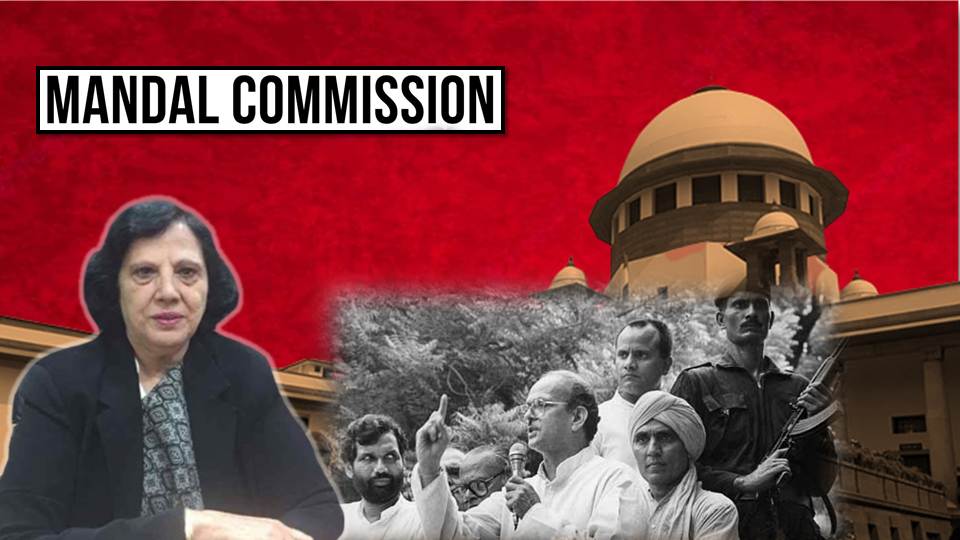Indra Sawhney Case: Mandal Commission is considered as the tipping point of class and caste division in politically independent India. Common understanding is that the country was divided in two halves. The radical nature of this division was close to the religious divide observed on the eve of independence. Indra Sawhney’s judgement brought some sense, at least to the top end of polity. Despite that it has glaring loopholes in it, a feature in consistent with the way law works.
Issues before the Apex Court
After a few rounds of battle in the legislative domain, the issue of reservation finally reached the Apex Court. Lawyer Indra Sawhney challenged it on several grounds. These include denial of equality of opportunity, caste being not a reliable indicator of backwardness and the third and most obvious issue was that it would undermine the efficiency of public institutions.
Also read: Aruna Ramchandra Shanbaug vs. Union of India: The case that paved the way for Passive euthanasia
16(4) was held as enabler of 16(1)
Court looked into whether Article 16(4) is an exception of 16(1). 16(1) advocates equality of opportunity while 16(4) denies it to the non-backward class of citizens. According to 6-3 majority judgement, denying entry to non-backward class of citizens is a legitimate way to ensure equality of opportunity. Quote, “For assuring equality of opportunity, it may well be necessary in certain situations to treat unequally situated persons unequally”.
This line of reasoning was held to be in line with sentiment prevailing in Constituent Assembly debates. In his speech Dr. Ambedkar had abridged that a substantial number of members of the Assembly were in favour of provisions enabling entry of certain communities in administrative roles. Court observed that even without Article 16(4), states could make it possible, it is just that 16(4) made it more explicit.
Also read: The Case of Ismail Farooqui vs. Union of India: Why Hindus Can Worship in Ram Mandir
While this line of argument is true in its intent, the problem it created paved the way for anti-forward bias in the long run. By not declaring Article 16(4) as an exception, positive discrimination and equality became complimentary with each-other. It literally places the definition of equality on a loose pedestal.
This is important since definition of terms matter in defining the real life circumstances and obliterate confusions. We rely on numbers only because we need clear-cut criteria, and definitions are also supposed to do that job.
50 percent reservation criteria is not inflexible
The second loophole with this Judgement is 50 per cent criteria placed on the reservation ceiling. Court held that an institution can not mandate to provide for more than 50 per cent of reservation. Apparently, this should have resulted in a halt on using reservation for vote-bank politics. But it did not.
The reason behind it is that concessions are allowed in exceptional circumstances. It is up to governments to decide what constitutes an exceptional circumstance. Akin to their nature, governments have not wasted a moment to breach this ceiling. They just made a law and put it under the 9th schedule to escape the scrutiny of the court.
Tamil Nadu, Telangana, Andhra Pradesh, Madhya Pradesh, Uttar Pradesh, Haryana, Rajasthan, Chhattisgarh, Maharashtra, and more recently, Jharkhand, have done this. Though, 9th Schedule is not fully immune after I R Coelho judgement, the blatant violations of 50 per cent cap is a testament to the flaw in Indra Sawhney judgement.
Also read: The Case of Ismail Farooqui vs. Union of India: Why Hindus Can Worship in Ram Mandir
Conundrum on criteria of backwardness and EWS reservation
This 50 per cent cap was used to cap caste based discrimination. When the Central government amended the Constitution to determine economic circumstance as a basis of backwardness, the 50 per cent ceiling just disappeared. As reported by TFI, the reason being that this upper limit was only effectively applicable to caste-based classifications under Articles 15(4), 15(5) and 16(4).
One of the reasons behind this new problem was that the Court did not foresee a futuristic Indian society in Indra Sawhney judgement. Government had provided for 10 per cent of reservation to Economically weaker section. In the Judgement, the Apex Court did not hold it to be an enabler of equality of opportunity under Clause 1 of Article 16.
According to the Apex Court, it would amount to discrimination against those individuals which are above the economic criteria fixed by the government. It was held to be Constitutionally invalid. More than 2 decades later, the government brought in constitutional amendment to give reservations to Economically Weaker Sections.
The Indra Sawhney case judgement is cited as one of the most balanced ones in India’s Judicial history. While it can be criticised on many fronts, it is also true that with this judgement a moral wall was created against populism.
Support TFI:
Support us to strengthen the ‘Right’ ideology of cultural nationalism by purchasing the best quality garments from TFI-STORE.COM
Also Watch:
https://www.youtube.com/watch?v=SxxNUkh7OWU&t=5s
